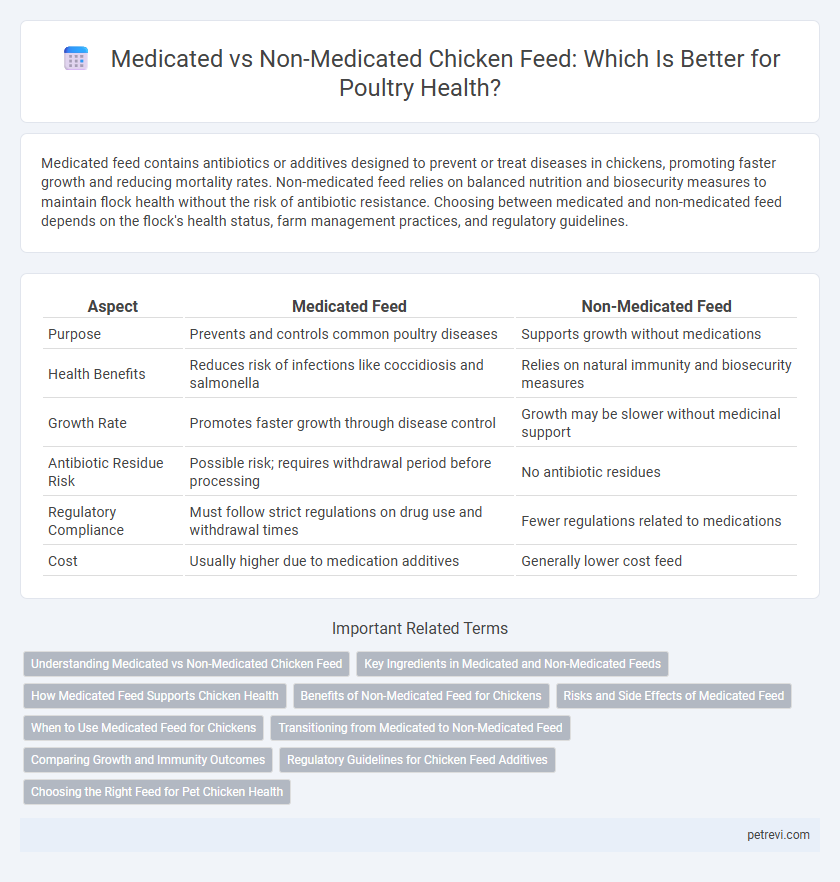Medicated feed contains antibiotics or additives designed to prevent or treat diseases in chickens, promoting faster growth and reducing mortality rates. Non-medicated feed relies on balanced nutrition and biosecurity measures to maintain flock health without the risk of antibiotic resistance. Choosing between medicated and non-medicated feed depends on the flock's health status, farm management practices, and regulatory guidelines.
Table of Comparison
| Aspect | Medicated Feed | Non-Medicated Feed |
|---|---|---|
| Purpose | Prevents and controls common poultry diseases | Supports growth without medications |
| Health Benefits | Reduces risk of infections like coccidiosis and salmonella | Relies on natural immunity and biosecurity measures |
| Growth Rate | Promotes faster growth through disease control | Growth may be slower without medicinal support |
| Antibiotic Residue Risk | Possible risk; requires withdrawal period before processing | No antibiotic residues |
| Regulatory Compliance | Must follow strict regulations on drug use and withdrawal times | Fewer regulations related to medications |
| Cost | Usually higher due to medication additives | Generally lower cost feed |
Understanding Medicated vs Non-Medicated Chicken Feed
Medicated chicken feed contains antibiotics or coccidiostats specifically designed to prevent or treat common poultry diseases like coccidiosis, promoting healthier flock growth and reducing mortality rates. Non-medicated feed lacks these additives and relies on biosecurity, vaccination, and proper management practices to maintain chicken health, appealing to producers aiming for antibiotic-free poultry products. Understanding the benefits and risks of both feeds is crucial for optimizing flock health, minimizing antibiotic resistance, and meeting consumer demand for safe, high-quality chicken.
Key Ingredients in Medicated and Non-Medicated Feeds
Medicated feed for chickens typically contains antibiotics or antiparasitics such as bacitracin or coccidiostats to prevent or treat specific diseases, enhancing flock health and growth performance. Non-medicated feed primarily consists of essential nutrients like proteins, vitamins, minerals, and amino acids aimed at supporting general health and development without pharmaceutical additives. Key ingredients in medicated feeds target disease control, while non-medicated feeds focus on balanced nutrition for immune support and optimal growth.
How Medicated Feed Supports Chicken Health
Medicated feed contains specific antibiotics or antiparasitic compounds that help prevent and control common poultry diseases such as coccidiosis and bacterial infections, thereby reducing mortality rates and promoting overall flock health. The inclusion of vitamins and minerals in medicated feed enhances immune function, facilitating faster recovery and improved weight gain in chickens. By targeting pathogens early, medicated feed supports optimal gut health and nutrient absorption, leading to stronger, more resilient birds.
Benefits of Non-Medicated Feed for Chickens
Non-medicated feed for chickens promotes natural immunity by supporting gut health through probiotics and organic nutrients, reducing dependency on antibiotics and minimizing antibiotic resistance risks. It enhances overall flock health and growth efficiency by providing balanced nutrition tailored to chickens' physiological needs without chemical residues. Using non-medicated feed aligns with consumer demand for antibiotic-free poultry products, improving marketability and sustainability in poultry farming.
Risks and Side Effects of Medicated Feed
Medicated feed for chickens includes antibiotics or drugs to prevent or treat diseases but carries risks such as antibiotic resistance, which can impact both poultry and human health. Side effects may include disruption of the gut microbiome, leading to digestive issues and lowered immunity in chickens. Non-medicated feed avoids these risks by promoting natural growth and health, relying on biosecurity and proper management to prevent disease.
When to Use Medicated Feed for Chickens
Medicated feed is essential for chickens during early stages of life or times of disease outbreak, as it contains antibiotics or anticoccidials to prevent or treat infections like coccidiosis. Non-medicated feed suits healthy chickens raised in clean environments, promoting growth without drug residues. Use medicated feed selectively based on veterinarian recommendations to ensure effective disease control and minimize antibiotic resistance.
Transitioning from Medicated to Non-Medicated Feed
Transitioning chickens from medicated to non-medicated feed requires careful management to maintain gut health and immunity, minimizing risks of disease outbreaks such as coccidiosis. Introducing probiotics, prebiotics, and optimized nutrient formulations enhances the microbiota balance and supports natural defenses during this transition. Monitoring growth performance and health indicators ensures a successful shift while sustaining productivity and reducing antibiotic resistance risks.
Comparing Growth and Immunity Outcomes
Medicated feed for chickens often includes antibiotics or additives designed to enhance growth rates and improve resistance to common diseases, resulting in faster weight gain compared to non-medicated feed. Non-medicated feed relies on natural ingredients and probiotics, promoting a balanced gut microbiome and reducing the risk of antibiotic resistance, which can support long-term immune health. Research shows that while medicated feed can accelerate early growth, non-medicated feed contributes to stronger immune function and sustainability in poultry farming.
Regulatory Guidelines for Chicken Feed Additives
Regulatory guidelines for chicken feed additives strictly differentiate between medicated and non-medicated feeds to ensure poultry health and food safety. Medicated feed must comply with specific approval processes from authorities like the FDA, including authorized drug concentrations and withdrawal periods to prevent antibiotic residues in meat. Non-medicated feed additives, such as vitamins and probiotics, are regulated primarily for safety and nutritional efficacy, with less stringent requirements but still subject to oversight to avoid contamination or misleading claims.
Choosing the Right Feed for Pet Chicken Health
Choosing the right feed for pet chicken health significantly impacts their growth and disease resistance, with medicated feed containing antibiotics to prevent common infections. Non-medicated feed relies on natural ingredients and supplements to boost immunity without antibiotic residues, making it suitable for organic or chemical-free poultry care. Evaluating the chicken's environment, susceptibility to disease, and owner preferences ensures optimal selection between medicated and non-medicated feed options.
Medicated Feed vs Non-Medicated Feed for Chicken Health Infographic

 petrevi.com
petrevi.com